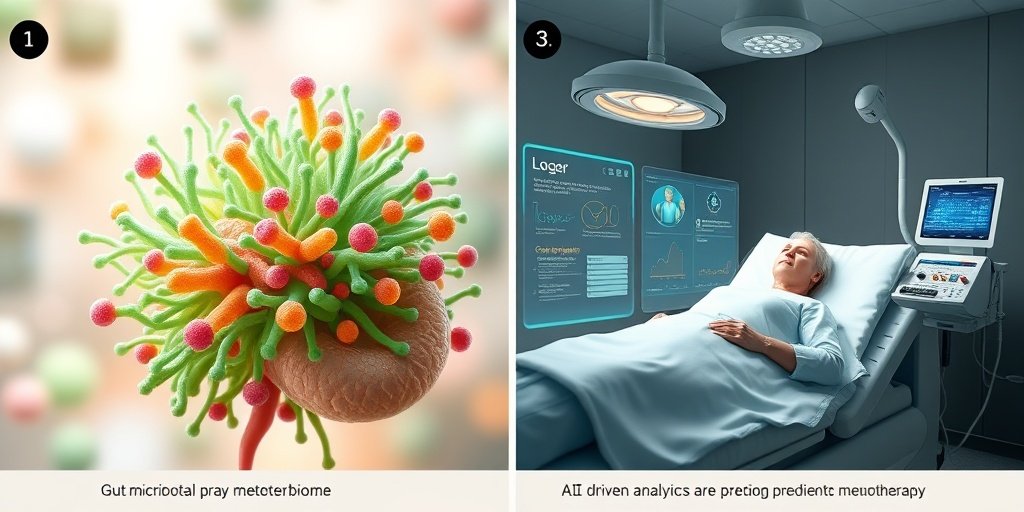⚡ Quick Summary
This study explored fecal microbiota signatures linked to immune responses in lung cancer (NSCLC) by analyzing 209 metagenomic samples and employing machine learning techniques. The findings revealed two key microbial biomarkers, s_Bacteroides caccae and s_Prevotella copri, associated with immunotherapy efficacy, highlighting the potential for microbiome-informed therapeutic strategies.
🔍 Key Details
- 📊 Dataset: 209 fecal metagenomic samples (154 baseline, 55 longitudinal)
- 🧩 Features used: Taxonomic and functional characterization of gut microbiota
- ⚙️ Technology: Machine learning algorithms (8 evaluated, random forest selected)
- 🏆 Performance: AUC values of 0.82 (species level) and 0.79 (genus level)
🔑 Key Takeaways
- 📊 Microbial α-diversity was significantly higher in responders compared to non-responders.
- 💡 Antibiotic administration amplified differences in microbial diversity.
- 👩🔬 Two pivotal biomarkers identified: s_Bacteroides caccae and s_Prevotella copri.
- 🏆 Random forest classifier achieved robust predictive performance with AUC values of 0.82 and 0.79.
- 🤖 P. copri was enriched in responders with poor progression-free survival (PFS < 3 months).
- 🌱 Antibiotic exposure significantly influenced the abundance of key microbial taxa.
- 🔬 KEGG analysis revealed enrichment of amino acid metabolism pathways in responders.
- 🧬 Majority of antibiotic resistance genes were linked to Bacteroidetes and Proteobacteria.

📚 Background
The landscape of cancer immunotherapy is complex, with significant variability in biomarkers that predict treatment responses. This heterogeneity has posed challenges in clinical settings, necessitating a deeper understanding of the gut microbiome’s role in modulating immune responses, particularly in lung cancer. Recent advancements in metagenomic profiling and machine learning offer promising avenues to uncover these intricate relationships.
🗒️ Study
This comprehensive study integrated publicly available global metagenomic datasets to analyze gut microbial signatures associated with immune responses in lung cancer patients. A systematic literature search identified relevant datasets, leading to the inclusion of 209 fecal metagenomic samples, which were characterized for taxonomic and functional differences between responders and non-responders to immunotherapy.
📈 Results
The study found that microbial α-diversity was significantly elevated in responders compared to non-responders, with antibiotic treatment further enhancing this diversity. The analysis identified two key microbial biomarkers, s_Bacteroides caccae and s_Prevotella copri, which were strongly correlated with immunotherapy efficacy. The random forest classifier demonstrated robust predictive performance, achieving AUC values of 0.82 and 0.79 at the species and genus levels, respectively.
🌍 Impact and Implications
The findings from this study represent a significant step towards understanding the gut microbiome’s role in cancer immunotherapy. By identifying reproducible microbial signatures predictive of treatment efficacy, this research lays the groundwork for developing microbiome-informed, personalized immunotherapeutic strategies. Such advancements could enhance patient outcomes and tailor treatments to individual microbiome profiles, ultimately improving the effectiveness of immunotherapy in lung cancer.
🔮 Conclusion
This study highlights the critical role of gut microbiota in influencing immune responses to cancer therapies. The identification of specific microbial biomarkers opens new avenues for personalized treatment approaches in lung cancer. As we continue to explore the intricate relationship between the microbiome and immune responses, the potential for integrating these insights into clinical practice becomes increasingly promising.
💬 Your comments
What are your thoughts on the role of gut microbiota in cancer treatment? Let’s engage in a discussion! 💬 Share your insights in the comments below or connect with us on social media:
Exploring fecal microbiota signatures associated with immune response and antibiotic impact in NSCLC: insights from metagenomic and machine learning approaches.
Abstract
BACKGROUND: Substantial interstudy heterogeneity in cancer immunotherapy-associated biomarkers has hindered their clinical applicability. To address this challenge, we performed a comprehensive integration of publicly available global metagenomic datasets. By leveraging metagenomic profiling and machine learning approaches, this study aimed to elucidate gut microbial signatures associated with immune response in lung cancer (LC) and to evaluate the modulatory effects of antibiotic exposure.
METHODS: A systematic literature search was conducted to identify relevant datasets, resulting in the inclusion of 209 fecal metagenomic samples: 154 baseline samples (45 responders, 37 non-responders, and 72 healthy controls) and 55 longitudinal samples collected during immunotherapy. We performed taxonomic and functional characterization of gut microbiota (GM) differentiating responders from non-responders, delineated microbiome dynamics during treatment, and assessed the impact of antibiotics on key microbial taxa. Among eight machine learning algorithms evaluated, the optimal model was selected to construct a predictive framework for immunotherapy response.
RESULTS: Microbial α-diversity was significantly elevated in responders compared to non-responders, with antibiotic administration further amplifying this difference-most notably at the species level. Integrative multi-omics analysis identified two pivotal microbial biomarkers, s_Bacteroides caccae and s_Prevotella copri, which were strongly associated with immunotherapy efficacy. A random forest-based classifier achieved robust predictive performance, with area under the curve (AUC) values of 0.82 and 0.79 at the species and genus levels, respectively. Notably, P. copri was further enriched in responders with poor progression-free survival (PFS <3 months), indicating a potential deleterious role. Antibiotic exposure significantly influenced the abundance and functional potential of these key taxa. KEGG-based functional analysis revealed the enrichment of amino acid metabolism pathways in responders. Additionally, CARD database annotation demonstrated that the majority of antibiotic resistance genes were associated with Bacteroidetes and Proteobacteria, implicating these taxa in shaping microbial-mediated therapeutic responses.
CONCLUSIONS: This study represents the first large-scale, cross-cohort integration of metagenomic data to identify reproducible GM signatures predictive of immune checkpoint inhibitor efficacy in LC. The findings not only underscore the prognostic relevance of specific taxa but also establish a foundation for developing microbiome-informed, personalized immunotherapeutic strategies.
Author: [‘Han W’, ‘Zhou Y’, ‘Wang Y’, ‘Liu X’, ‘Sun T’, ‘Xu J’]
Journal: Front Cell Infect Microbiol
Citation: Han W, et al. Exploring fecal microbiota signatures associated with immune response and antibiotic impact in NSCLC: insights from metagenomic and machine learning approaches. Exploring fecal microbiota signatures associated with immune response and antibiotic impact in NSCLC: insights from metagenomic and machine learning approaches. 2025; 15:1591076. doi: 10.3389/fcimb.2025.1591076